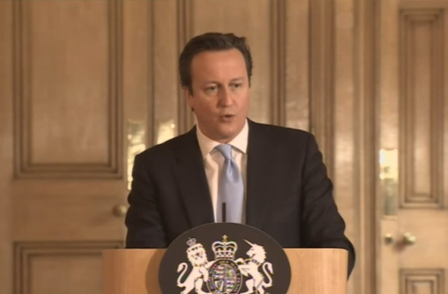
A cross-party deal has been agreed on a Royal Charter to regulate the press which is set in stone via legislation saying that a two-thirds majority of both Houses of Parliament is needed to amend it.
Such a move was thought to have been beyond the pale for both press owners and the Conservatives.
The parties have agreed to a legislative amendment today which won't specifically mention press regulation, but which will underpin a clause in the press regulation Royal Charter which states that a two-thirds majority of both houses of Parliamanet is needed to amend it.
Conservative leader David Cameron said today that this does not amount to "statutory underpinning" of press regulation.
He said: "What it is is simply a clause that says politicians can't fiddle with this so it takes it further away from politicians, which is actually, I think, a sensible step.
He added: "What we wanted to avoid and we have avoided is a press law. Nowhere will it say what this body is, what it does, what it can't do, what the press can and can't do. That, quiet rightly, is being kept out of Parliament. So no statutory underpinning but a safeguard that says politicians can't in future fiddle with this arrangement."
He added: "I'm delighted with this deal. I've always wanted two things and that is a strong regulator to stand up for the victims and we have got that and also a proper defence of press freedom and we have got that.
"What's happened is that everyone has accepted my argument for a Royal Charter. Why does that matter? Well I thought it was important to avoid a press law, a law that said the press can do this, the regulator's got to do that. That would be dangerous, that's not going to happen and that's what we secured and that's why this is a good deal."
Under the cross-party deal a clause is being inserted into the Enterprise and Regulatory Reform Bill in the Lords later this afternoon.
It states: "Where a body is established by Royal Charter after 1 March 2013 with functions relating to the carrying on of an industry, no recommendation may be made to Her Majesty in Council to amend the body's Charter or dissolve the body unless any requirements included in the charter on the date it is granted for Parliament to approve the amendment or dissolution have been met."
An Opposition source accused the Conservatives of trying to save face, insisting: "This is not a little bit of statute, this is not a dab of statute, this is statute pure and simple."
Deputy Prime Minister Nick Clegg said: "In effect what we have done is adopt the so-called 'royal charter plus' in full, which we published last Friday and it is underpinned by legislation – both to install a real system of costs and damages and crucially to make sure that future governments can't mess around with the Royal Charter in a way that everyone had concerns (about)."
On Friday, the Conservatives published a revised press regulation Royal Charter which included key concessions to campaigners. But Labour and the Lib Dems published a rival document and insisted that the charter needed to be protected from future ministerial interference by passing a law which stated that a two-thirds majority of both sides of Parliament would be needed to change it.
After further cross-party talks which ended at 2.30am this morning the Conservatives appear to have conceded this final point rather than see their plan face a likely defeat in the Commons today.

"It will be a regulator, a system of complaints where the regulator has teeth so they can direct apologies if wrong is done and it is independent of the press, which is so important because for too long we have had a system where the press have been marking their own homework."
He added: "People who revealed MPs' expenses, people who revealed phone-hacking have nothing to fear from what has been agreed.
"I think a free press has nothing to fear from what has been agreed. This is about a press that doesn't abuse its own power and, if that power is abused, victims have a right to redress because, so often in the past when things went wrong – take the case of the McCanns – they felt they had nobody to turn to."
Commons showdown

Email pged@pressgazette.co.uk to point out mistakes, provide story tips or send in a letter for publication on our "Letters Page" blog






